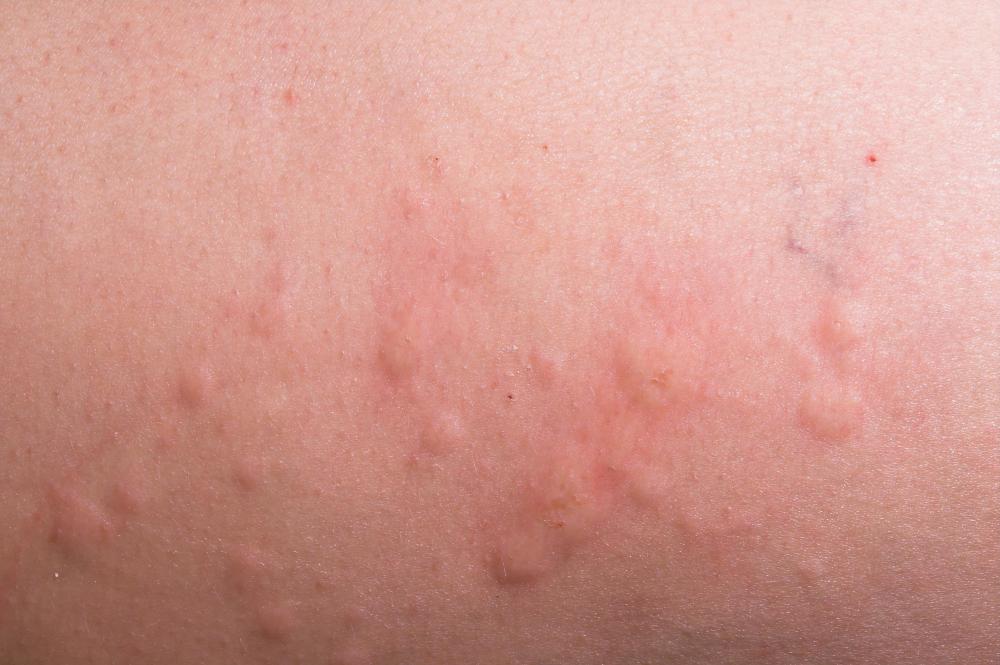At WiseGEEK, we're committed to delivering accurate, trustworthy information. Our expert-authored content is rigorously fact-checked and sourced from credible authorities. Discover how we uphold the highest standards in providing you with reliable knowledge.
What Is Solar Urticaria?
Solar urticaria is a skin condition in which hives develop when the skin is exposed to sunlight, although in some cases artificial light may bring on symptoms as well. With solar urticaria, when the skin is exposed to sunlight, the patient may experience symptoms such as redness, itching, and the development of hives. This condition may sometimes be confused with sunburn, although those with this type of urticaria typically exhibit symptoms within minutes of sun exposure. The cause of this skin condition is not clearly understood, although the body seems to produce excess chemicals when exposed to sunlight, resulting in the abnormal skin reaction. Treatment typically involves the use of over-the-counter or prescription medications such as antihistamines or topical creams.
When a person who has solar urticaria is exposed to sunlight or artificial light in some cases, symptoms often develop within minutes or sometimes up to an hour later. The chemicals released by the body cause the blood vessels to open up, leading to a fluid buildup underneath the skin. This can cause reddened patches of itchy skin. These patches of red skin can become swollen, a condition known as hives. Solar urticaria can develop in anyone regardless of age or gender.

While the urticaria can usually be prevented or treated relatively easily, potential complications can occur. For instance, if a large area of skin has been affected, a significant amount of fluid may be lost underneath the skin. This may lead to symptoms such as pale skin, nausea, and dizziness.
Outbreaks of solar urticaria may be able to be prevented by taking specific precautions. Direct sunlight should be avoided whenever possible, especially when the sun is highest in the sky. When this is not possible, protective clothing should be worn to cover as much of the skin as possible, including wearing a wide-brimmed hat and sunglasses. Sunscreen should be applied several times per day when it is necessary to be out in the sunlight.

Treatment for outbreaks of solar urticaria usually involve the use of an over-the-counter or prescription antihistamine. Steroid creams or ointments may be applied directly to the affected areas of skin. A specialized treatment known as phototherapy may be performed by a medical professional in an effort to toughen the skin and make it less sensitive in some cases. A dermatologist is a doctor who specializes in the diagnosis and treatment of skin conditions and can help the patient develop an individualized treatment plan.
AS FEATURED ON:
AS FEATURED ON:
















Discussion Comments
I was diagnosed with solar urticaria in 2004 when I was living in North Carolina. No one knew what it was. When an allergy doctor figured out what it actually was I was sent to a specialist in South Carolina and he was amazed at how severe it was (at times).
Sunblock doesn't help, but makes it worse. Wearing light clothes doesn't help; it goes through the clothes. it comes through windows. The ozone layer is very thin in North Carolina and when it became life threatening in 2005, I decided to move back to Las Vegas and have been relatively okay.
It is based on the 11 year sun cycle (as is the hurricane season) but when I first got it, it was at the tail end of the cycle. Two days ago it attacked viciously. Doctors have said they don't know what causes it and they don't know what cures it and it could go away as quickly as it appeared. I was hoping but apparently it's back. The itching is the worst and of course that just spreads it.
How does solar urticaria develop suddenly? Does it have to do with a weakened immune system?
I have very fair skin, so I've always had to be careful about sun exposure to avoid getting burnt. But for thirty years, I was not allergic to the sun. It started suddenly last summer and has been persistently affecting me since.
I'm taking antihistamines right now but I don't know how long I can keep taking them. I also hate the steroid creams my dermatologist has given me. They help with the itching but cause so many side effects.
@anamur-- I think your mom's urticaria was not very severe. I don't think I could ever do that treatment because I can't even stay in the sun for three minutes. I get bumps, swelling and redness even in that short amount of time.
My mom used to have solar uricaria, but we always referred to it as a sun allergy. She treated it by slowly desensitizing her skin to sunlight. She did it by getting small amounts of sunlight everyday. As her skin got used to it, she got more and more sun exposure until she could actually go to the beach without getting hives. It took several years, but it worked. She basically did phototherapy on her own.
Post your comments